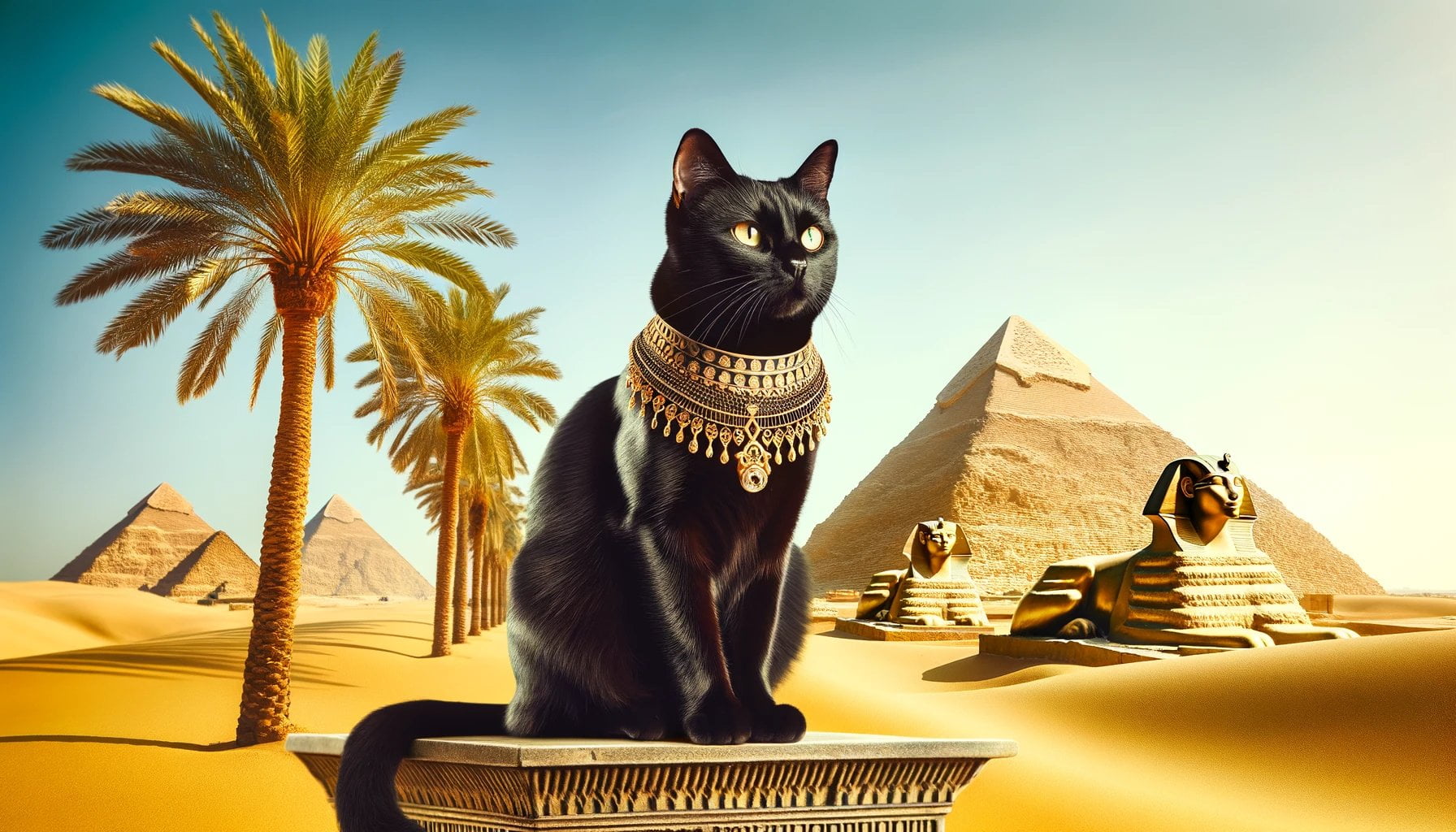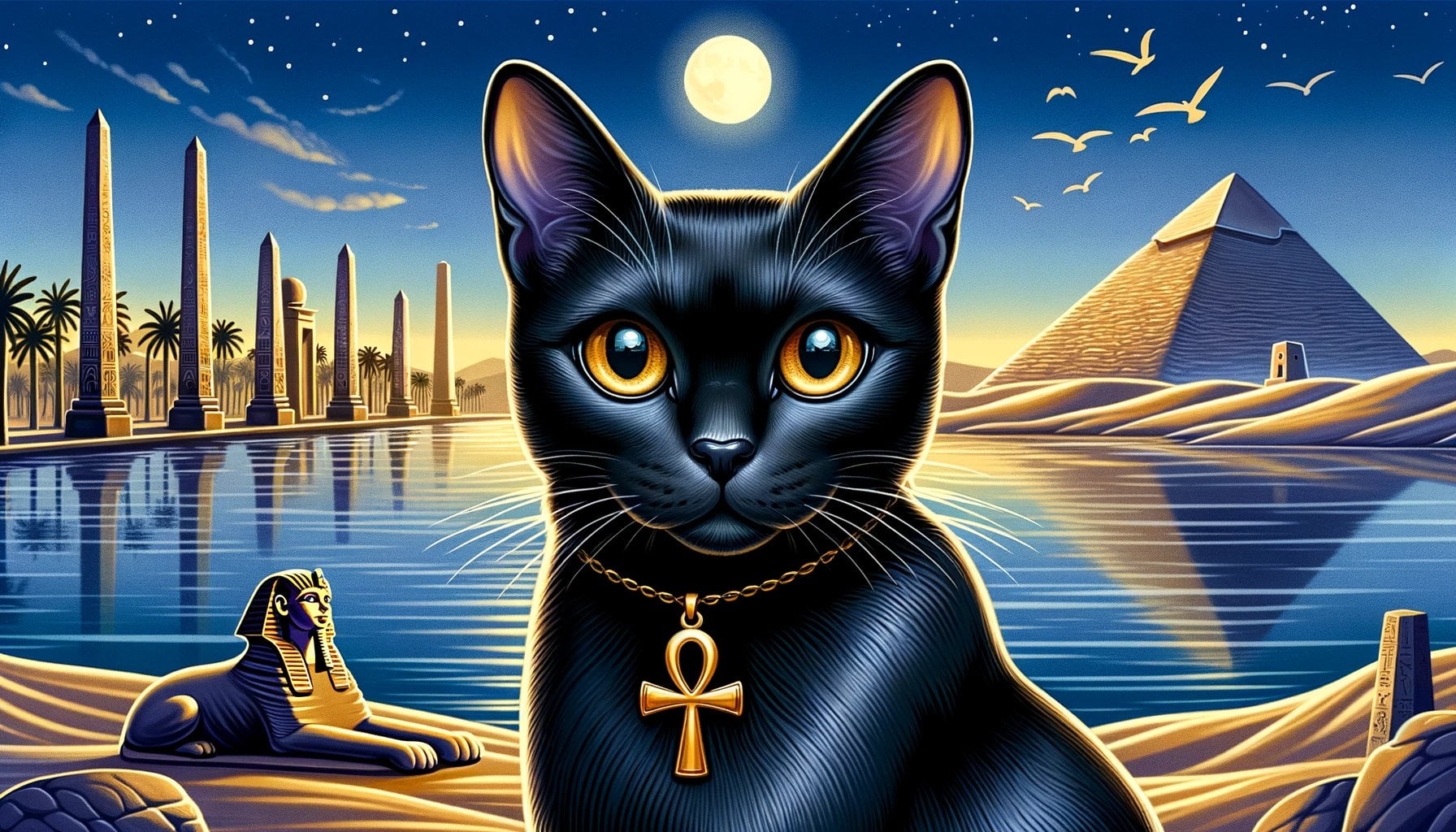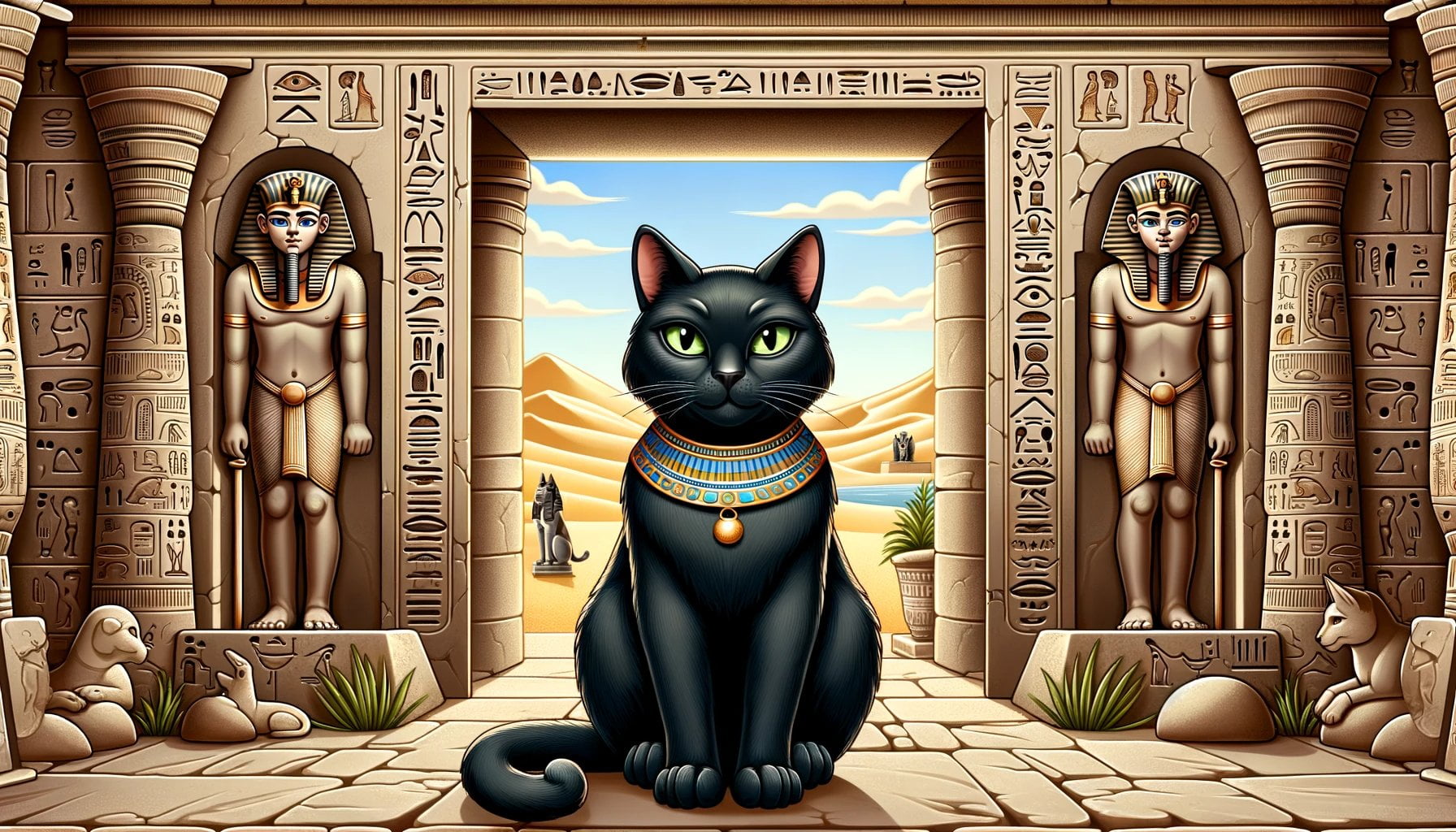Black cats were rather revered and fascinating in ancient Egypt. Apart from their adoration and respect, these enigmatic feline beings were thought to have a heavenly link. Black cats, sometimes shown as a lioness with the head of a domestic cat, were connected with the strong goddess Bastet by their sleek ebony fur and piercing emerald eyes. Investigating the secrets of black cats in ancient Egyptian civilization reveals a world of symbolism, rites, and superstitions highlighting the great part these mysterious animals performed in the daily life of the ancient Egyptians.
Key Learnings:
- In ancient Egyptian society, black cats—especially those with green eyes—were thought to be lucky.
- Bastet, the ancient Egyptian cat deity, was loved and venerated by the people.
- Two main native cat breeds from ancient Egypt were African wildcats and jungle cats.
- Among various ancient Egyptian gods, like Mafdet, Sekhmet, and Mut, cat-like heads were portrayed.
- For about 3,000 years, cats were an integral part of social and religious activities in ancient Egypt.
- During the Battle of Pelusium, cats—showcasing their loyalty—were much prized by the Egyptians.
- Egyptian gods were sculpted by artists using cat-like heads.
- Cats—more especially, domesticated African wildcats—were kept by pharaohs.
- Growing revered and venerated, domestic cats were embalmed, coffined, and interred in cat cemeteries upon death.
- From the 22nd Dynasty forward, Bastet’s temple in Bubastis attracted attention.
Black Cats in Ancient Egypt: Unveiling the Mysteries of Bastet

Black cats were extremely important in ancient Egyptian society and closely entwined with the customs and beliefs of the time. We shall reveal the secrets of these mysterious beings and clarify their relationship with the adored goddess Bastet in this post.
Black cats’ symbolism in ancient Egypt
Black cats—especially those with emerald eyes—were considered in ancient Egypt as lucky and prosperous symbols. They were supposed to fight evil spirits and provide good vitality. The Egyptians were enthralled with their elegant and enigmatic look, and the black cat came to symbolize strength and protection.
The Admirement of Bastet and the Link to Black Cats
The goddess Bastet was fundamental in the respect for black cats in ancient Egypt. Celebrated as the goddess of protection, fertility, and home, she was often showing her connection with feline traits, Bastet was portrayed with the head of a lioness or domestic cat. Considered as the goddess of harmony and delight, Bastet was supposed to bring luck and protection for the homes.
Cats’ role in ancient Egyptian society
For 3,000 years, cats were vital members of ancient Egyptian society. The African wildcat and the jungle cat were the two main natural breeds of cats the Egyptians identified from their country. Apart from being cherished companions, cats were considered as holy entities. They were given great respect and their welfare came first. When a cat died, it was embalmed, laid in a casket, and buried in specific cat cemeteries.
Cats in religious practices: portrayal
Many of the ancient Egyptian gods were shown with cat-like heads, therefore illustrating the close relationship between religious ideas and animals. The earliest known feline goddess, Mafdet stood for protection from deadly animals and justice. The goddess with lioness head Sekhmet personified the force of war and healing. Another well-known goddess, Mut, indicated motherhood and grandeur by sporting a cat-like head.
The Battle of Pelusium and Egyptian Cat Devotement
The Egyptians’ close relationship with their cats was clear-cut during the Battle of Pelusium in 525 BCE. Seeking to seize Egypt, Cambyses II of Persia strategically had his men wear cats as shields. Bound by their love of cats, the Egyptians hesitated to assault, knowing damage would befall these revered animals. The effect of this surprising respect was a major change in the course of the war that produced the Persian triumph.
Cat artistic depictions and statues
Ancient Egyptian sculptors and artists created beautiful cat statues, often showing gods with cat-like heads. These finely detailed sculptures, which highlight the Egyptians’ respect of feline forms, reveal the workmanship captured the cultural value put on cats and their relationship with holy entities.
Temple of Bastet at Bubastis
From the 22nd Dynasty forward, Bastet’s temple, located in the city of Bubastis, became well-known. Reflecting the respect and dedication the Egyptians held for the goddess, pilgrimages to this holy location were made in her honors. Offering prayers, carrying out ceremonies to show thanks and seek Bastet’s blessings, the temple was the hub of worship.
With their connection to the goddess Bastet and their part in religious rituals, black cats ultimately became rather important in ancient Egyptian society. Their presence delighted the Egyptians and they were revered as symbols of protection and good fortune. The riddles around black cats in ancient Egypt still captivate and serve as a reminder of the great cultural legacy of this remarkable society.
Here are some fascinating topics about ancient Egypt that you won’t want to miss:
- Explore the intriguing world of the supreme god of ancient Egypt, here.
- Uncover the secrets of magic in ancient Egypt, and how it influenced their culture, here.
- Delve into the ten laws that governed ancient Egypt, and their impact on society, here.
- Discover the bird venerated in ancient Egypt and its significance in their mythology, here.
- Learn about the crocodile god of ancient Egypt and its role in their religious beliefs, here.
- Find out the surprising connection between toothpaste and ancient Egypt, here.
- Get a glimpse of the dark side with the bad things about ancient Egypt, here.
- Explore the influential ancient queens of Egypt and their contributions to society, here.
- Unravel the mysteries of ancient Egypt and the enigmatic secrets they hold, here.
- Discover the significance of snakes in ancient Egypt’s mythology and culture, here.
Delve into these captivating topics and embark on a journey through the fascinating world of ancient Egypt!
Black Cats in Religious Rituals and Ceremonies
Rich in cultural legacy and fascinating religious rituals, ancient Egypt is well known for its reverence of black cats. These animals were very important in religious events and rites inside this interesting society. Respected for their connection with the goddess Bastet and their supposed power to provide luck and protection, these enigmatic feline species were cherished. Let us explore the fascinating universe of black cats in ancient Egyptian civilization.
Cats and Their Natural Relationship
Black cats were revered and kept as treasured pets to draw luck and wealth in ancient Egypt, seen as gifts from the holy. These magical beings added to their holy character since they were said to represent the souls of pharaohs following death. Cats were revered by the ancient Egyptians as magical animals able to fend off bad spirits and guard against snakes. Their representation in art and objects clearly shows this great respect for cats; many gods, like Mafdet, Bastet, and Sekhmet, are seen with cat-like heads.
Black Cats Have Symbolic Meaning
In ancient Egypt, black cats were revered for their devoted and protective traits and had great symbolic meaning rather than just being regular companions. Rich folks treated their cherished cat friends like royalty and adorned them with gems. With their presence signifying wealth and protection against evil forces, these graceful creatures became a natural component of social and religious events. The Egyptians’ loyalty to cats is demonstrated strikingly in the Battle of Pelusium in 525 BCE, when they refrained from fighting because the Persians used cats as shields.
Cat Cult and Ritualistic Behaviour
Cat devotion and respect went beyond homes in ancient Egypt. Discovered in Speos Artemidos, Bubastis, and Saqqara, cat cemeteries reflected the importance placed on these elegant animals and included several cat mummies and sculptures. Egypt’s economy revolved heavily on the cat cult since cats were sold and bred for embalming. It comprised the trade of food, oils, and resins required for feline remains’ preservation. A common pilgrimage place honoring the goddess was Bastet’s temple in Bubastis.
- In ancient Egypt, black cats were revered as holy gifts and companions.
- Cats were revered by ancient Egyptians who also thought they possessed mystical powers.
- Cats were supposed to bring luck, wealth, and defense against evil.
- Among the other gods shown with cat-like traits were Mafdet, Bastet, and Sekhmet.
- Important facets of ancient Egyptian life were cat graves and the cat cult.
- The Battle of Pelusium underlined the Egyptians’ great respect for animals.
Citation:
– The National Geographic Kids article provides information on the worship of animals in ancient Egypt, including their reverence for dogs and cats.
– The Discover Magazine article explores the superstitions surrounding black cats in modern times.
Superstitions and Beliefs Surrounding Black Cats in Ancient Egypt
Black cats were revered and quite important in ancient Egypt, where they belonged. These enigmatic feline animals represented the presence of the holy and were thought to have particular abilities. Let’s explore the superstitions and ideas about black cats in ancient Egypt closer.
The Divine Link
Black cats were connected by ancient Egyptians to the goddess Bastet, who was much revered as the guardian of good fortune and protection. Black cats were a holy depiction of the goddess herself since their elegant and mysterious quality matched Bastet’s features.
Defenders Against Injury
Black cats were firmly thought to be able to protect their owners from harm. Considered as guardians, they kept their human friends free from evil spirits, bad luck, and cruelty. Black cats were supposed to be talismans of protection, shielding their owners from the future.
Contemporary Superstitions in Egypt
Fascinatingly, views of black cats in Egypt have evolved throughout time. Black cats are usually seen in modern Egypt as prophets of terrible fortune. Most people think that malevolent genies live among these feline animals and deliver bad luck to those who come across them. Black cats thus cause harmful superstitions and terror in contemporary Egyptian society.
Source 1: Black Cat Spiritual Meaning Egypt
Source 2: Superstitions About Black Cats – What Do They Symbolize?
Black Cats as Symbols of Protection and Good Luck
Black cats were quite important in ancient Egyptian society as lucky symbols of protection. Beloved as representations of the divine and connected with the goddess Bastet, these cats were renowned for their capacity to fight malevolence and bad luck. Let’s investigate the complex symbolism and ideas behind black cats in prehistoric Egypt.
Black Cat with Goddess Bastet
Closely associated with the goddess Bastet, the protector, fertility, and motherhood divinity, the black cat was usually shown with the head of a lioness or domestic cat. Bastet’s emblem was the black cat. The ancient Egyptians thought they would be blessed with Bastet’s protecting abilities, riches, and glory by inviting a black cat into their houses.
Association with the Sun God
Within ancient Egyptian mythology, the black cat was connected with the sun deity. Considered the parent of all other gods, it was supposed to be the expression of the sun god. This link improved the black cat’s heavenly and potent symbolism value in Egyptian society. [^2^]
Protective Authority
Apart from their relationship with certain gods, black cats were thought to have natural protective ability. These cats were seen by Egyptians as protectors who might shield their owners from injury and bring luck into their life. Black cats were revered and given particular treatment based on this notion; they were even let to eat from royal plates and adorned with jewels.
Key Learnings:
- Considered as the guardian emblem, the black cat was metaphorically connected to the goddess Bastet.
- Considered heavenly and strong, black cats were connected with the sun god.
- Black cats were thought to have protective abilities that would bring good fortune and ward against damage.
Sources:
[^1^]: Catauthors – Black Cats in Egypt
[^2^]: Angelmeaning – Black Cat Spiritual Meaning
[^3^]: National Geographic Kids – Cats Rule in Ancient Egypt

FAQ
Q1: Why in ancient Egyptian civilization did black cats hold significance?
A1: Black cats were revered in ancient Egyptian society since they were intimately connected with the goddess Bastet, who stood for protection and good fortune. They were supposed to bless and fight negative energy and bad luck.
Q2: In ancient Egyptian mythology, what part did the goddess Bastet fulfil?
A2: In ancient Egyptian mythology, the goddess Bastet was greatly esteemed. Her associations were with fertility, motherhood, and protection. Often shown with the head of a lioness or domestic cat, Bastet was thought to bless those who adored her and provide good prosperity.
Q3: In ancient Egyptian society, was black cat associated with the sun god?
A3: Black cats were thought to be connected in ancient Egyptian society with the sun god. Considered as the father of all gods, they were supposed to be the expression of the sun god. This connection raised black cats’ divine and forceful symbolic value even more.
In ancient Egypt, black cats were thought to have defensive abilities.
A4: Black cats were seen in ancient Egypt as defenders. Considered guardians of their owners, they were thought to have natural defensive abilities. Black cats were supposed to protect Egyptians from danger and provide good fortune in their houses.
Q5: In what way were black cats handled in ancient Egyptian society?
A5: In ancient Egyptian society, black cats were very esteemed and handled with great dignity. They wore jewelry and received particular privileges including dining from the royal plates. Considered holy creatures, black cats were said to bless their owners and offer protection.
q
- Senior at What Age: Benefits & Eligibility Guide - March 29, 2025
- Unlocking Senior Benefits: How Old is a Senior? Your Complete Guide - March 29, 2025
- Master Russian Politeness:A Guide to Saying Please - March 29, 2025
















